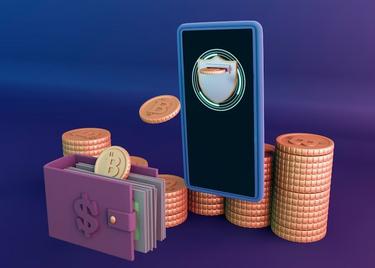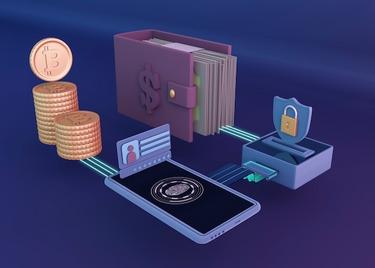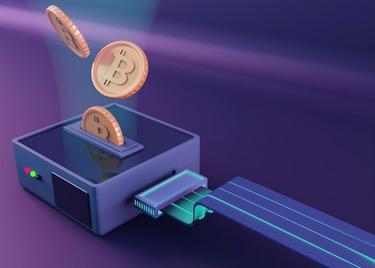Custodial or hot crypto wallet
A custodial or hot crypto wallet[1] refers to a type of digital wallet that is connected to the internet and managed by a third party[2]. These wallets store the user’s private keys[3] on online servers, providing convenience for quick access and transactions with cryptocurrencies[4]. Despite their convenience, they pose certain security risks since the control over the private keys—and consequently, the assets—is in the hands of the service provider.
- Characteristics of Custodial Hot Wallets
- Key Facts
- Custodial or hot crypto wallet
- What are Custodial Crypto Wallets?
- Operational Mechanisms of Custodial Wallets
- Benefits of Using Custodial Wallets
- Security Considerations and Risks
- Regulatory and Compliance Aspects
- Choosing Between Custodial and Non-Custodial Wallets
Characteristics of Custodial Hot Wallets
Custodial wallets are often provided by cryptocurrency[5] exchanges, enabling users to trade and manage their assets within the platform. The primary advantage of these wallets is their ease of use, especially for beginners in the cryptocurrency space. Users do not need to worry about losing their private keys, as the custodian handles security and backup. However, this also means that users must trust their custodian to secure their assets and to act in their best interest.
The security of custodial wallets depends largely on the measures taken by the provider, such as encryption[6] and regular security audits[7]. Nonetheless, they remain vulnerable to hacking and other forms of cyber attacks. In response, many providers offer insurance policies to cover potential losses due to security breaches[8].
Key Facts
- Custodial wallets are managed by a third party, requiring trust from the user.
- These wallets are user-friendly, making them suitable for beginners.
- The custodian is responsible for the security and backup of private keys.
- Custodial wallets are more vulnerable to online attacks compared to cold wallets.
Custodial or hot crypto wallet
In the dynamic world of cryptocurrency, managing and securing digital assets is a primary concern for both individual users and institutions. Custodial, or hot, crypto wallets play a crucial role in this ecosystem by offering a way to store, send, and receive cryptocurrencies with an emphasis on accessibility and convenience. Understanding the nuances of custodial wallets, including their operational mechanisms, benefits, and potential risks, is crucial for anyone looking to navigate the crypto space effectively.
What are Custodial Crypto Wallets?
Custodial wallets are digital wallets where the private keys—essential for accessing and transferring cryptocurrencies—are managed by a third party, such as a cryptocurrency exchange[9] or a wallet service. This arrangement means that the user entrusts the security and management of their assets to the wallet provider. Hot wallets are always connected to the internet, making them readily accessible but also exposing them to higher risks of online attacks.
Operational Mechanisms of Custodial Wallets
Custodial wallets operate by storing the user’s private keys on servers maintained by the service provider. When a user wants to execute a transaction, the wallet software communicates with the provider’s servers to sign off on the transaction using the stored private keys. This process is seamless from the user’s perspective, requiring minimal technical knowledge about the underlying blockchain[10] technology.
Benefits of Using Custodial Wallets
One of the main advantages of custodial wallets is convenience. Users can access their funds from any device with an internet connection, without worrying about losing their private keys. Additionally, many custodial wallet providers offer user-friendly interfaces, making it easier for beginners to navigate the complexities of cryptocurrency transactions. Custodial wallets also facilitate quicker transactions and can offer integrated services like exchanges, further enhancing their convenience.
Security Considerations and Risks
While custodial wallets offer convenience, they also concentrate risk by storing many users’ private keys in a single location. This makes them attractive targets for hackers. The history of cryptocurrency is riddled with instances of custodial services being breached, leading to significant losses. Users must trust the security measures and ethical practices[11] of the wallet provider, as the loss of the private keys by the provider could result in the irreversible loss of funds.
Regulatory and Compliance Aspects
Custodial wallet providers are often subject to financial regulations, depending on their jurisdiction. This can include requirements for customer identification (KYC), anti-money laundering (AML) protocols, and other compliance measures. While this regulatory oversight[13] can provide a level of security and legitimacy, it also means that users may have to sacrifice a degree of privacy.
Choosing Between Custodial and Non-Custodial Wallets
The choice between using a custodial or non-custodial (where the user controls the private keys) wallet depends on individual preferences for security versus convenience. Non-custodial wallets offer more control and security, but they also require the user to take full responsibility for their private keys and backup procedures. Custodial wallets, on the other hand, offer a more user-friendly experience at the expense of control and potential security risks.
In conclusion, custodial crypto wallets provide an accessible entry point for individuals and organizations looking to engage with the cryptocurrency market. However, the convenience they offer comes with trade-offs in terms of security and control. Users should carefully consider these factors, along with the reputation and security practices of the wallet provider, before entrusting their digital assets to a custodial wallet.
- Wallet — A digital tool that allows users to store and manage their cryptocurrency addresses.
- Third Party — An entity that operates the custodial wallet, holding the cryptographic keys on behalf of the user.
- Private Keys — Cryptographic keys that are used to access cryptocurrency addresses and sign transactions.
- Cryptocurrencies — Digital or virtual currencies that use cryptography for security and operate on a decentralized system, unlike traditional currencies.
- Cryptocurrency — Digital or virtual currency secured by cryptography, facilitates secure, anonymous transactions.
- Encryption — The process of converting information or data into a code, especially to prevent unauthorized access.
- Security Audits — Independent examinations of a gambling operation's systems and practices to ensure compliance with security standards and the protection of customer data and funds.
- Security Breaches — Unauthorized access to digital assets, potentially leading to the loss of cryptocurrency.
- Exchange — A platform where individuals can buy, sell, or trade cryptocurrencies for other digital currency or traditional currency.
- Blockchain — A decentralized digital ledger recording cryptocurrency transactions across multiple computers.
- Ethical Practices — The moral principles guiding the conduct of gambling operators, including honesty, integrity, and responsibility.
- Compliance — The act of adhering to legal standards and regulations established by governmental bodies and regulatory agencies, particularly in the context of financial operations and transactions involving cryptocurrencies.
- Regulatory Oversight — The supervision by authorities to ensure that market participants comply with legal and ethical standards.
- Coinbase. 'What is a custodial wallet?'. Coinbase.com, 2021.
- Binance Academy. 'The Difference Between Custodial and Non-Custodial Wallets'. Binance Academy, 2020.
- Kraken. 'Security Practices on Kraken'. Kraken.com, 2021.



